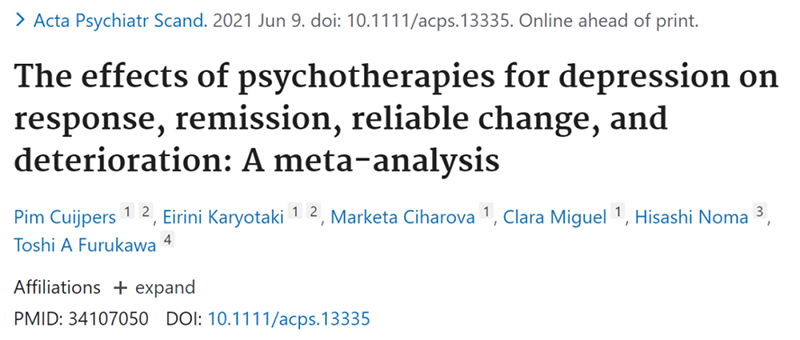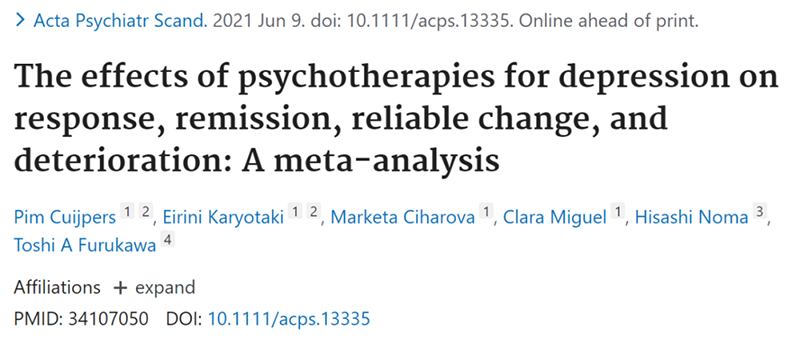The antidepressant efficacy of psychotherapy: a core set of data | Research Express
- Categories:News
- Author:
- Origin:
- Time of issue:2021-06-10
- Views:0
(Summary description)This meta-analysis of 228 randomized controlled studies shows that when used in adult patients with depression, the overall effective rate of psychotherapy at 2 (±1) months after baseline is 41%, conventional treatment, waiting list, and placebo They are 17%, 16%, and 31% respectively.
The antidepressant efficacy of psychotherapy: a core set of data | Research Express
(Summary description)This meta-analysis of 228 randomized controlled studies shows that when used in adult patients with depression, the overall effective rate of psychotherapy at 2 (±1) months after baseline is 41%, conventional treatment, waiting list, and placebo They are 17%, 16%, and 31% respectively.
- Categories:News
- Author:
- Origin:
- Time of issue:2021-06-10
- Views:0
Yimaitong Guide Reading
This meta-analysis of 228 randomized controlled studies shows that when used in adult patients with depression, the overall effective rate of psychotherapy at 2 (±1) months after baseline is 41%, conventional treatment, waiting list, and placebo They are 17%, 16%, and 31% respectively.
When is used in adult depressed patients, the clinical cure rate of psychotherapy is 26%-34%, and various controls are 9%-17%.
The incidence of clinically significant deterioration in adult depression patients after receiving psychotherapy was 5%, compared with 12%-13% of controls.
In addition, there is no significant difference in the effectiveness of different types of psychotherapy (cognitive behavior therapy, problem solving therapy, interpersonal therapy, "third wave" psychotherapy, behavior activation therapy, life review therapy). This finding is similar to another online meta-analysis published recently by the author that compares the antidepressant efficacy of eight mainstream psychotherapies.
Psychotherapy is the first-line treatment for depression. Evidence shows that the short-term antidepressant efficacy of psychotherapy represented by cognitive behavioral therapy (CBT) is equivalent to that of antidepressants, and the long-term efficacy may even be better than that of antidepressants.
However, previous meta-analysis to explore the antidepressant efficacy of psychotherapy usually report the effect size, such as cohen's d. Such data is not easy to interpret. In clinical terms, after a patient receives psychological treatment, how likely it is that the treatment will be effective, clinically cured or the condition will be significantly worsened, and how likely is the above-mentioned possibility when not receiving psychological treatment, it is also information that doctors and patients need to know.
Research Introduction
In this context, Pim Cuijpers and his collaborators at the Vrije Universiteit Amsterdam in the Netherlands conducted a meta-analysis to evaluate and compare psychotherapy with a series of control settings (conventional treatment, waiting list, placebo medication) for depressed patients Timely efficient. The study was published online in Acta Psychiatr Scand. on June 9.

In short, this study included randomized controlled studies comparing the antidepressant efficacy of various psychotherapies and control settings. The subjects were all adult depressed patients, and the duration of the study was ≥4 weeks. Only types of psychotherapy with at least 10 research evidence were included. Depression is defined based on diagnostic interviews or self-rating scale total scores.
The main outcome of the study is the treatment effect (reduction of depressive symptoms ≥50%) rate, and the main observation time point is 2(±1) months after baseline. The researchers also calculated the clinical cure rate (17 HAMD total scores <7), clinically significant disease deterioration rate (based on the Reliable Deterioration Index), and the effective risk ratio of psychotherapy compared to control (RR), the number of treatment needed (NNT), etc. The specific research design and statistical methods are detailed in the original literature.
Research result
Researchers selected 228 randomized controlled studies that met the inclusion criteria from 24,771 titles, with a total of 23,574 depressed patients. The psychotherapy group and the control group were 12,308 and 11,266, respectively. 75 studies (32.9%) had a low risk of bias.
The types of psychotherapy involved in 228 research studies include cognitive behavioral therapy (148 items), problem solving therapy (24 items), interpersonal therapy (21 items), ``third wave'' psychotherapy (21 items), and behavioral activation therapy ( (20 items), life review therapy (12 items); the number of studies using conventional treatment, waiting list, and placebo as a control were 117, 106, and 8, respectively.
Efficient
At 2 (±1) months after baseline, the overall effective rate of psychotherapy was 41% (95% CI: 0.38~0.43); when only patients who completed treatment were considered, the effective rate was 45%; all those who dropped out were considered When the treatment is effective, the effective rate is 51%. The heterogeneity of all analyses was high (>77%).
Specific to the type of psychotherapy, life review therapy and interpersonal therapy have the lowest effective rate (37%), and behavioral activation therapy has the highest effective rate (46%). However, there was no significant difference between different treatment types (p=0.39).
Specific to the treatment method, the effective rate of individual treatment is significantly higher than that of self-help and mixed forms of treatment (p=0.01); but the author points out that this difference may be a chance finding.
When the follow-up is 3-6 months and the follow-up is 13-24 months, the effective rates of psychotherapy are 37% and 48%, respectively.
In various control settings, the overall effective rates of conventional treatment, waiting list, and placebo were 17%, 16%, and 31% (p<0.001).
Therapeutic effective RR and NNT
Compared with conventional treatment, waiting list, and drug placebo, the effective RRs of psychotherapy were 2.12 (95% CI: 1.80-2.50), 2.61 (95% CI: 2.29-2.98), and 1.48 (95% CI: 1.14--2. 1.93). However, there is significant publication bias in the results related to conventional treatment and waiting list, and the RR is significantly reduced after adjusting for this factor.
Compared with conventional treatment, waiting list, and drug placebo, the NNT of psychotherapy was 5.3 (95% CI: 3.9~7.4), 3.9 (95% CI: 3.2~4.8), and 6.7 (95% CI: 3.5~23.0), respectively ; After adjusting for publication bias factors, the NNT were 9.7, 5.7, and 14.3, respectively, and the latter was no longer significant.
Clinical cure rate
The clinical cure rate of psychotherapy is 26%-34%, and the control is 9%-17%; the RR and NNT of psychotherapy compared with the control are 2.11-4.39 and 3.3-7.0, respectively.
Clinically significant deterioration
Psychotherapy has a clinically significant deterioration rate of 5%, and the control is 12%-13%; the RR and NNT of the psychotherapy compared with the control are 0.27-0.37 and 2.8-7.4, respectively.
Sensitivity analysis roughly supports the above results.
in conclusion
Overall, 41% of depressed patients can get significant improvement after receiving psychotherapy, compared with only 17% of patients receiving conventional treatment. Similarly, about one-third of patients can reach clinical cure standards after receiving psychotherapy, compared with only 9%-17% of controls.
In addition, there is no significant difference in the effectiveness of different types of psychotherapy. This finding is similar to an online meta-analysis published by the author Pim Cuijpers and others in World Psychiatry recently that compares the antidepressant efficacy of eight mainstream psychotherapies.
Scan the QR code to read on your phone
Jiangsu Healsun Meical Co., Ltd.
Tel:025-86669187
e-mail:Office@Healsun.com
Address:Room 1616, Building F1, Intercity Space Station, No. 12 Jinlan Road, Jiangning District, Nanjing, China
WeChat public account
Jiangsu Healsun Meical Co., Ltd. 苏ICP备19029369号-3





